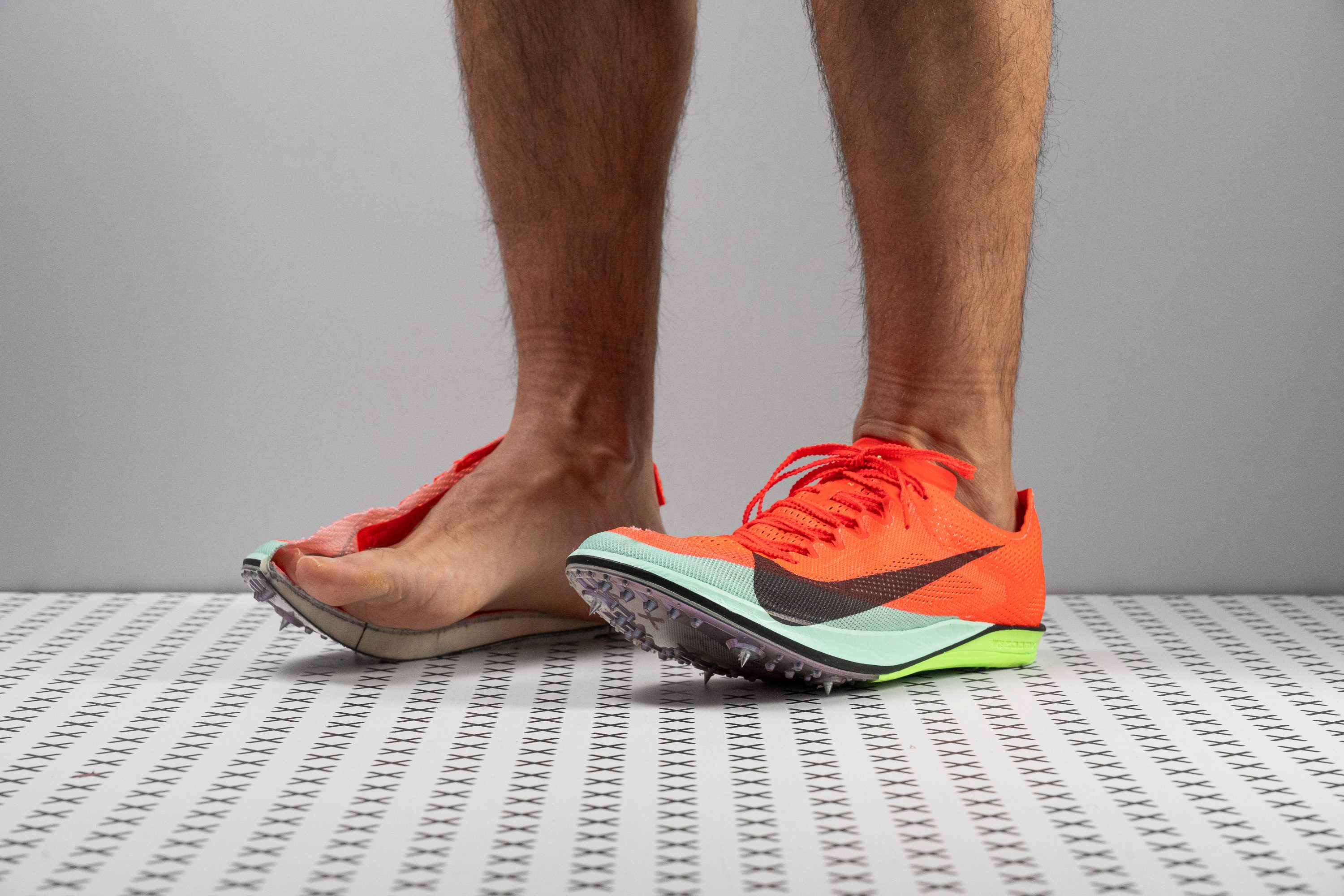Our verdict
Pros
- Incredibly lightweight
- Built for fast paces
- Hyper-responsive carbon plate
- Great for mile-to-10K events
- Breezy upper keeps feet cool
- Dialed-in fit with notched laces
- Bouncy ZoomX midsole
- Can handle 800m races too
Cons
- Premium price
- Too stiff for some
- Non-removable pins
- Not ideal for track warriors
Audience verdict
Comparison
The most similar track spikes compared
+ + Add a shoe | |||||
|---|---|---|---|---|---|
| Audience score | 88 Good! | 95 Great! | 90 Great! | 96 Superb! | |
| Price | $190 | $160 | $190 | $150 | |
| Weight lab | 4.6 oz / 129g | 5.1 oz / 145g | 4.8 oz / 135g | 4.7 oz / 133g | |
| Breathability | Breathable | Breathable | Breathable | Breathable | |
| Use | Long DistanceMid Distance | Long DistanceMid Distance | Long DistanceMid Distance | Long DistanceMid Distance | |
| Removable spikes | ✗ | ✓ | ✓ | ✓ | |
| Width / fit | Wide | Wide | Medium | Narrow | |
| Toebox width | Medium | Medium | Medium | Medium | |
| Drop lab | 4.1 mm | 0.2 mm | 0.6 mm | 2.0 mm | |
| Size | True to size | True to size | True to size | Slightly small | |
| Midsole softness | Balanced | Balanced | Soft | Balanced | |
| Tongue padding | Thin | Average | Thin | Average | |
| Stiffness | - | Moderate | Moderate | Flexible | |
| Torsional rigidity | Stiff | Stiff | Stiff | Stiff | |
| Heel counter stiffness | Flexible | Flexible | Flexible | Flexible | |
| Outsole thickness | Average | Average | Thin | Average | |
| Outsole hardness | - | - | - | Very soft | |
| Heel tab | None | None | None | None | |
| Heel stack lab | 19.8 mm | 19.9 mm | 19.9 mm | 19.8 mm | |
| Forefoot | 15.7 mm | 19.7 mm | 19.3 mm | 17.8 mm | |
| Insole thickness | Thin | Very thick | Thick | Average | |
| Midsole width - forefoot | Average | Average | Average | Average | |
| Midsole width - heel | Average | Average | Very wide | Average | |
| Ranking | #12 Bottom 7% | #3 Top 24% | #7 Bottom 46% | #1 Top 8% | |
| Popularity | #5 Top 39% | #2 Top 16% | #3 Top 24% | #9 Bottom 30% |
Who should buy
After testing the Dragonfly 2 Elite on the track and in the lab, we believe it’s:
- Ideal for runners who absolutely want a carbon plate in their superspikes for top-tier performance.
- Perfect for distances from the mile to the 10K if you're chasing fast times.
- Great for powerful runners who can fully leverage the FlyPlate’s propulsive effect in this version.
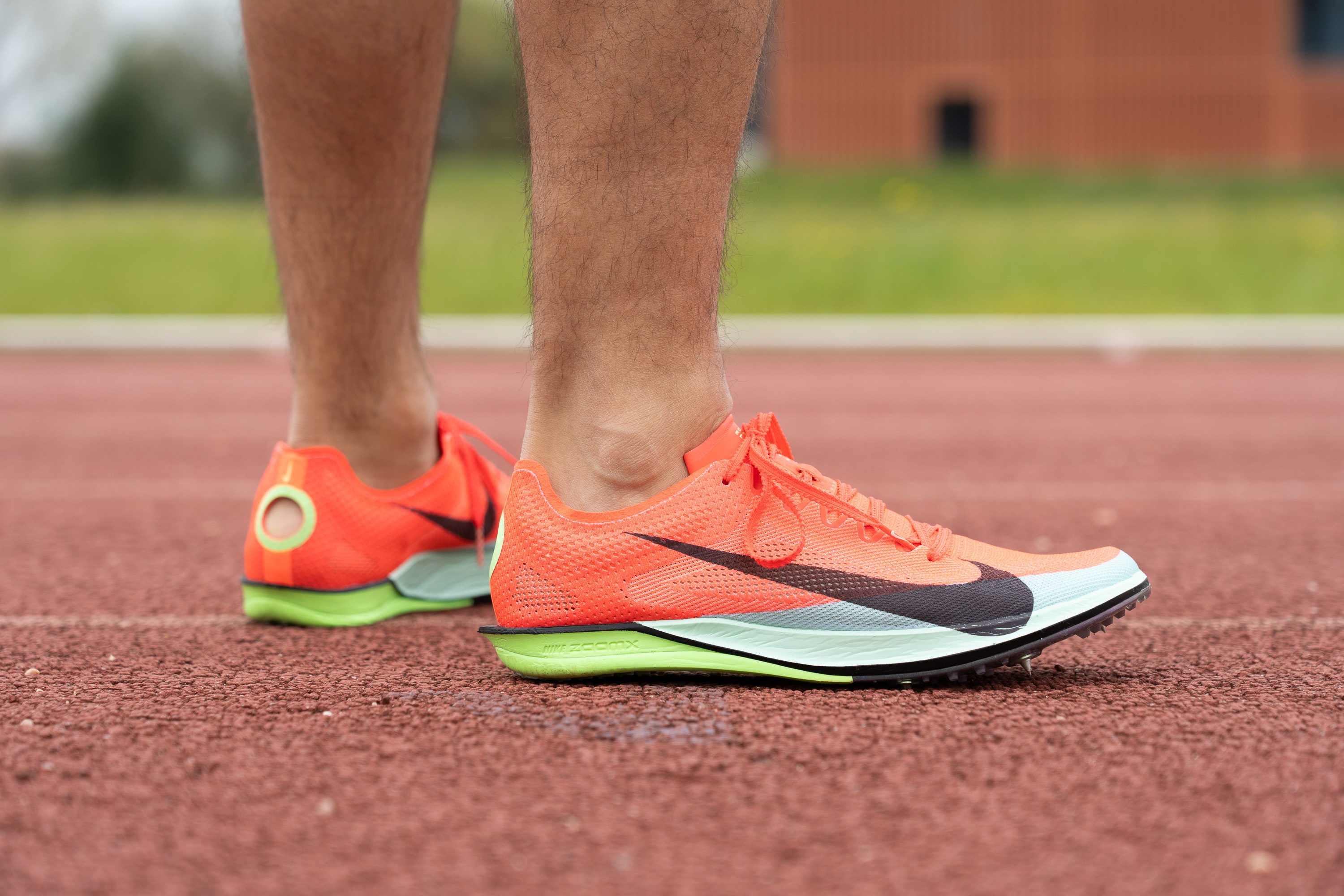
Who should NOT buy
We think the Dragonfly 2 Elite isn’t the best pick for runners who want a training-friendly spike or experience tendon issues frequently. We found that its carbon plate feels stiff and muscle-demanding. The standard Dragonfly 2 offers a more forgiving ride at a lower price, making it a smarter option for lighter sessions.
Also, if you're not racing beyond 1500 meters and often double with 800s or even 400s, we believe there are better choices. Our take is that the Nike Victory 2 fits this need more precisely—it still features a carbon plate, but adds a punchier, double Air Zoom unit that favors fast-and-explosive efforts over long-and-steady ones.
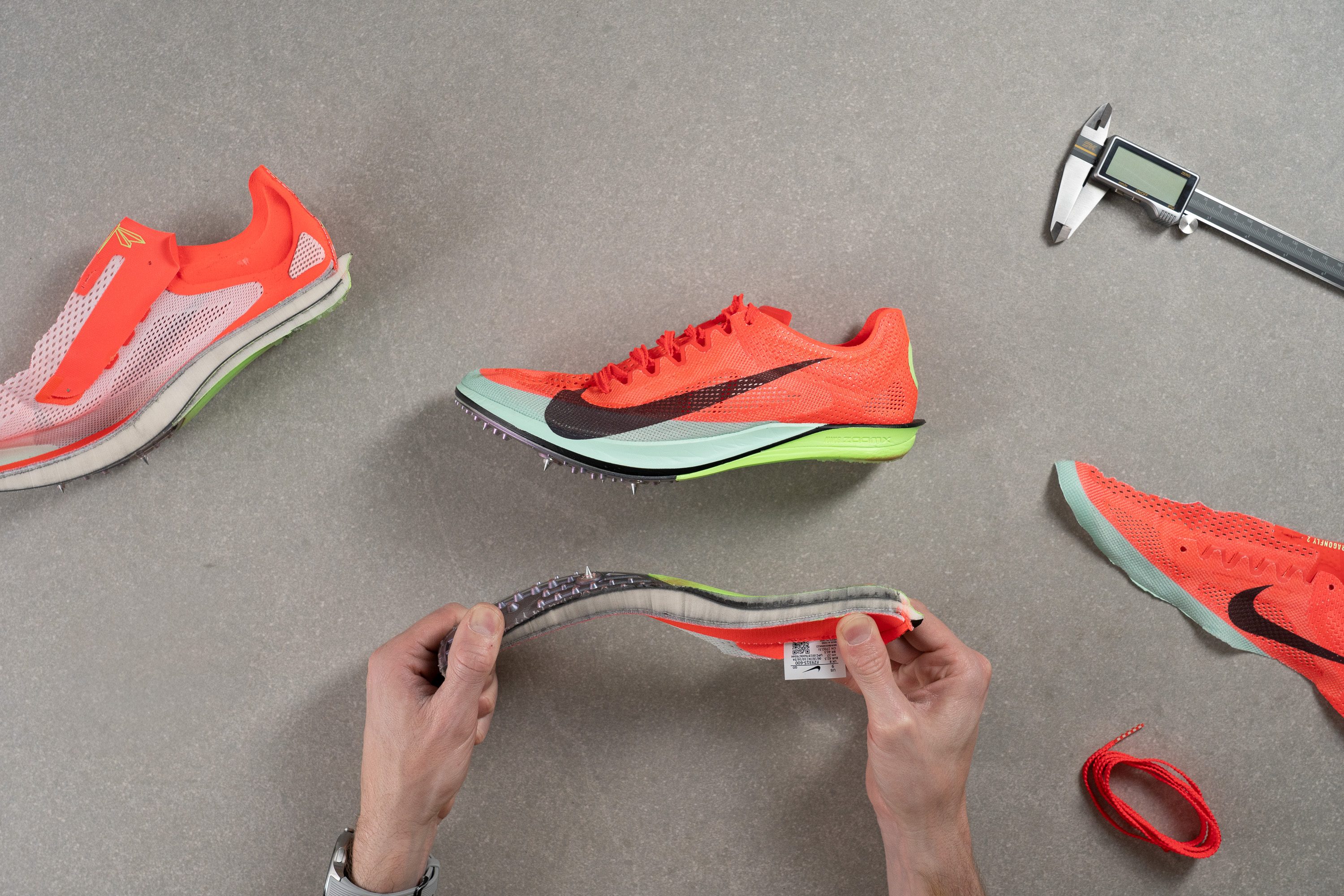
Cushioning
Heel stack
We tested the Dragonfly 2 Elite in the track and immediately noticed its foamy midsole—ideal for 5K/10K races where fresh legs in the final lap make all the difference.
According to our digital calipers, the stack height hits 19.8 mm—right under the 20-mm cap set by World Athletics in 2024. So we found a regulation-maxed design that pushes the limits of what a legal spike can offer.
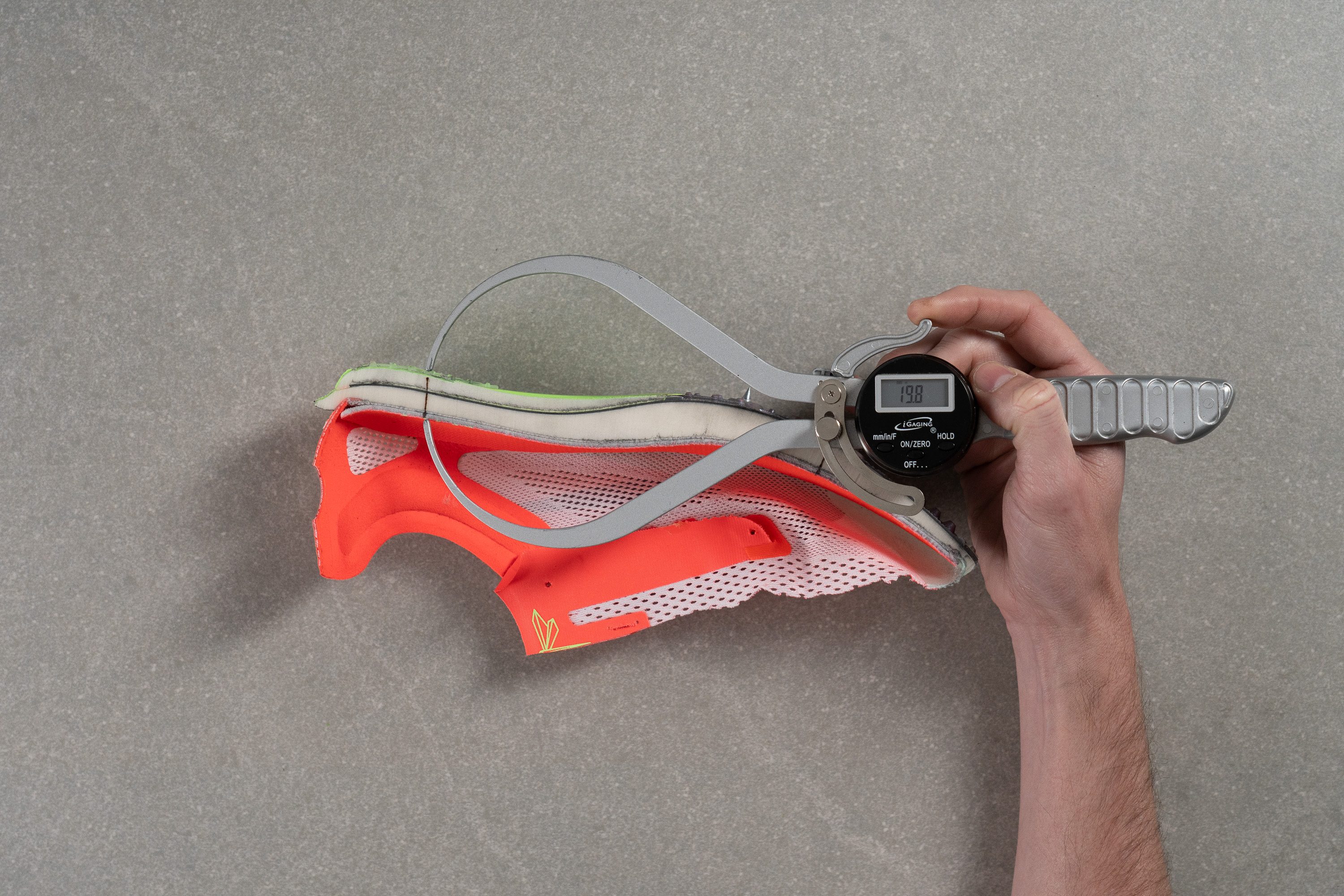
| Dragonfly 2 Elite | 19.8 mm |
| Average | 16.0 mm |
Forefoot stack
The forefoot stack of the Dragonfly 2 Elite measures slightly lower at 15.7 mm, aiming for a fast-rolling geometry with a moderate drop. Most track spikes feature zero or 1–2 mm drop, but for long-distance events, this setup works too.
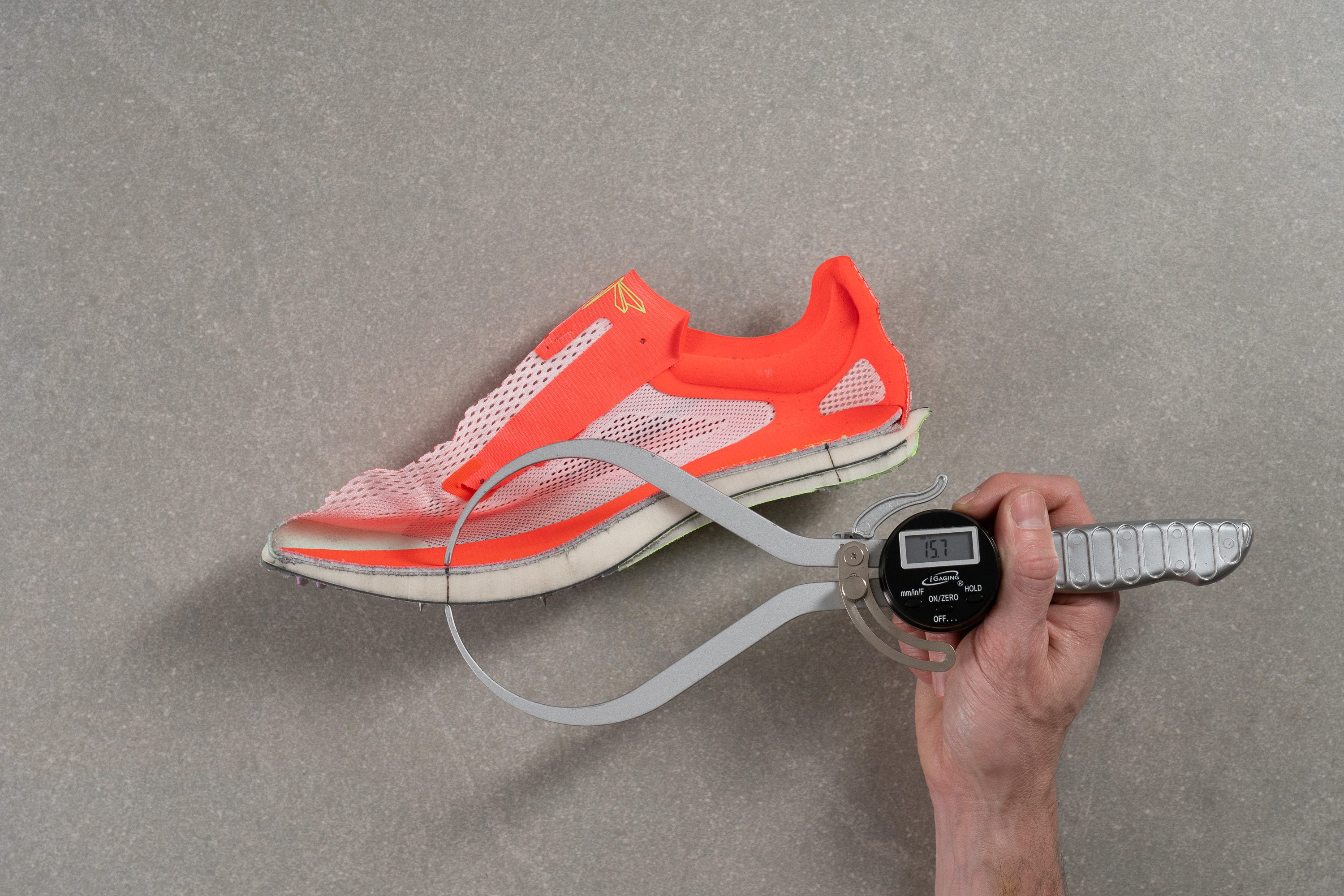
| Dragonfly 2 Elite | 15.7 mm |
| Average | 15.3 mm |
Drop
The 5.4 mm drop feels moderate—or even high—for a track spike, just as we mentioned earlier. Runners who favor ultra-flat setups might not love the Dragonfly 2 Elite.
However, the forward-rolling sensation is unmistakably present. It provides that momentum-boosting feel that really shines during the closing laps of longer races.
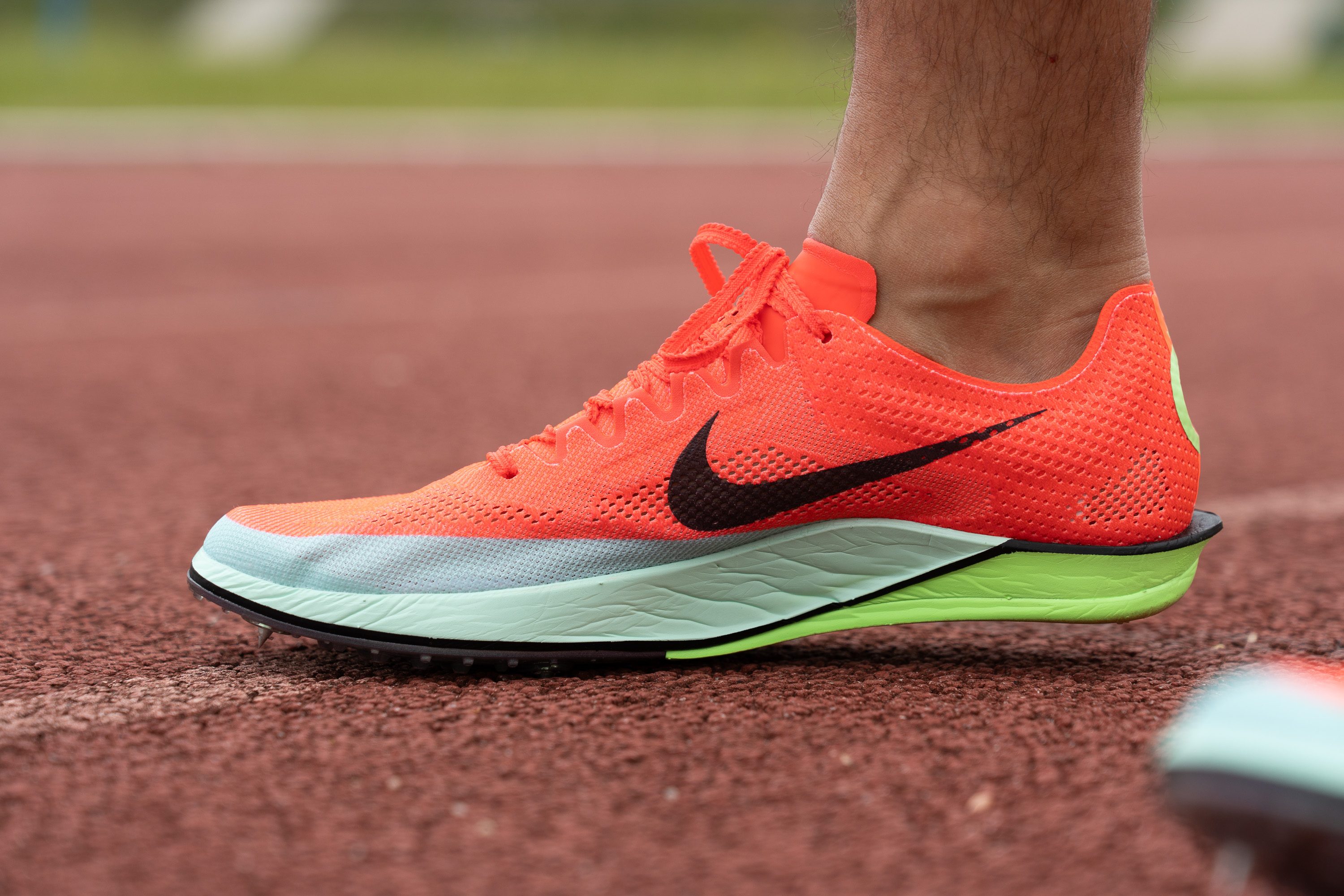
| Dragonfly 2 Elite | 4.1 mm |
| Average | 0.7 mm |
Midsole softness
The Dragonfly 2 Elite features a full ZoomX midsole. We found two separate slabs: the main one sits above the full-length carbon plate, and the secondary, green one lies below it, mainly under the midfoot and heel.
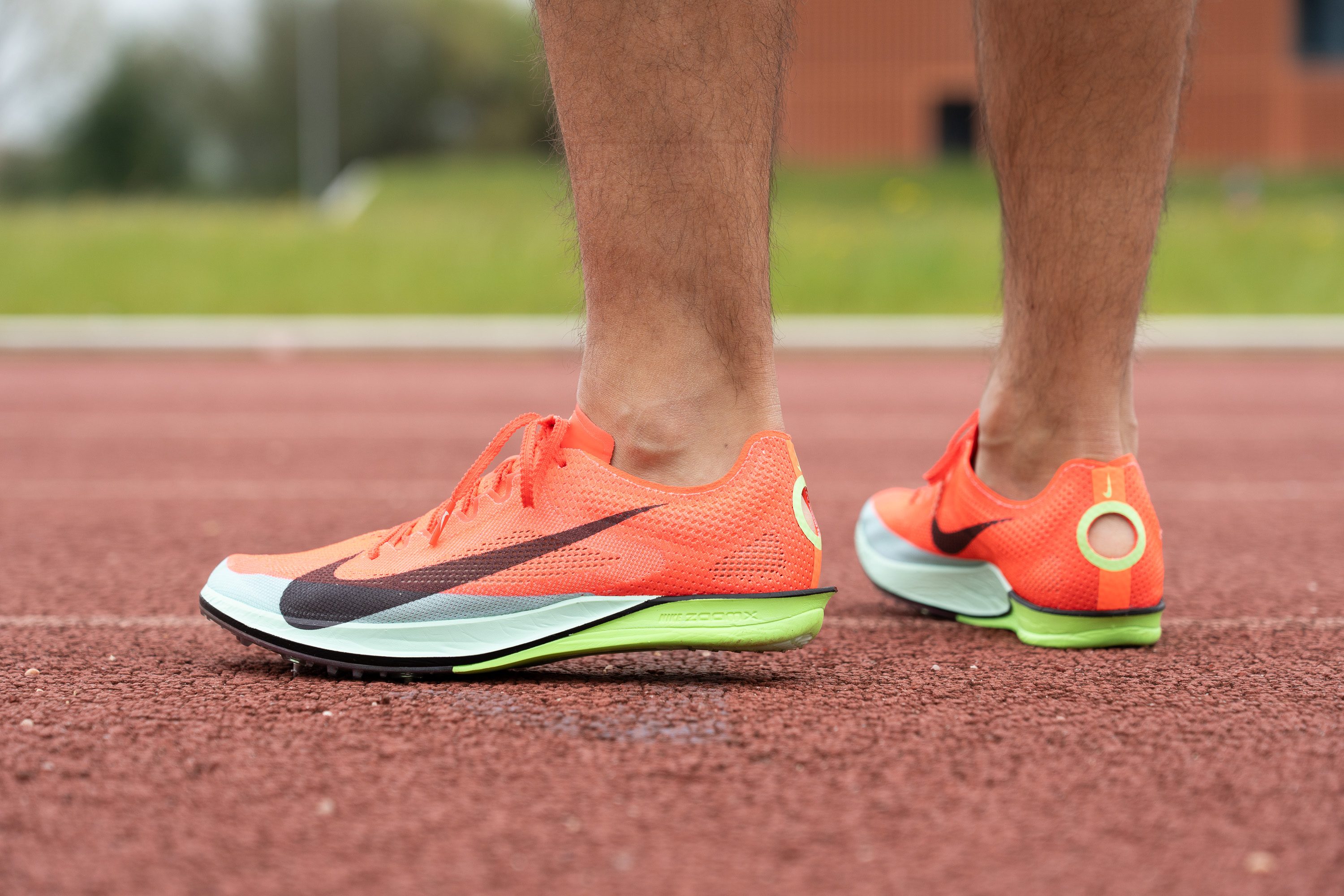
The primary, thicker slab measured 22.5 HA on our Shore A durometer. That’s slightly firmer than what we see in road racing shoes, but it makes sense here—track spikes don’t allow much foam, and going ultra-soft isn’t ideal.
Energy return, as expected from ZoomX, is sky-high. So no complaints from us—we’re just looking at an elite-grade foam inside an elite-level spike, exactly as it should be.
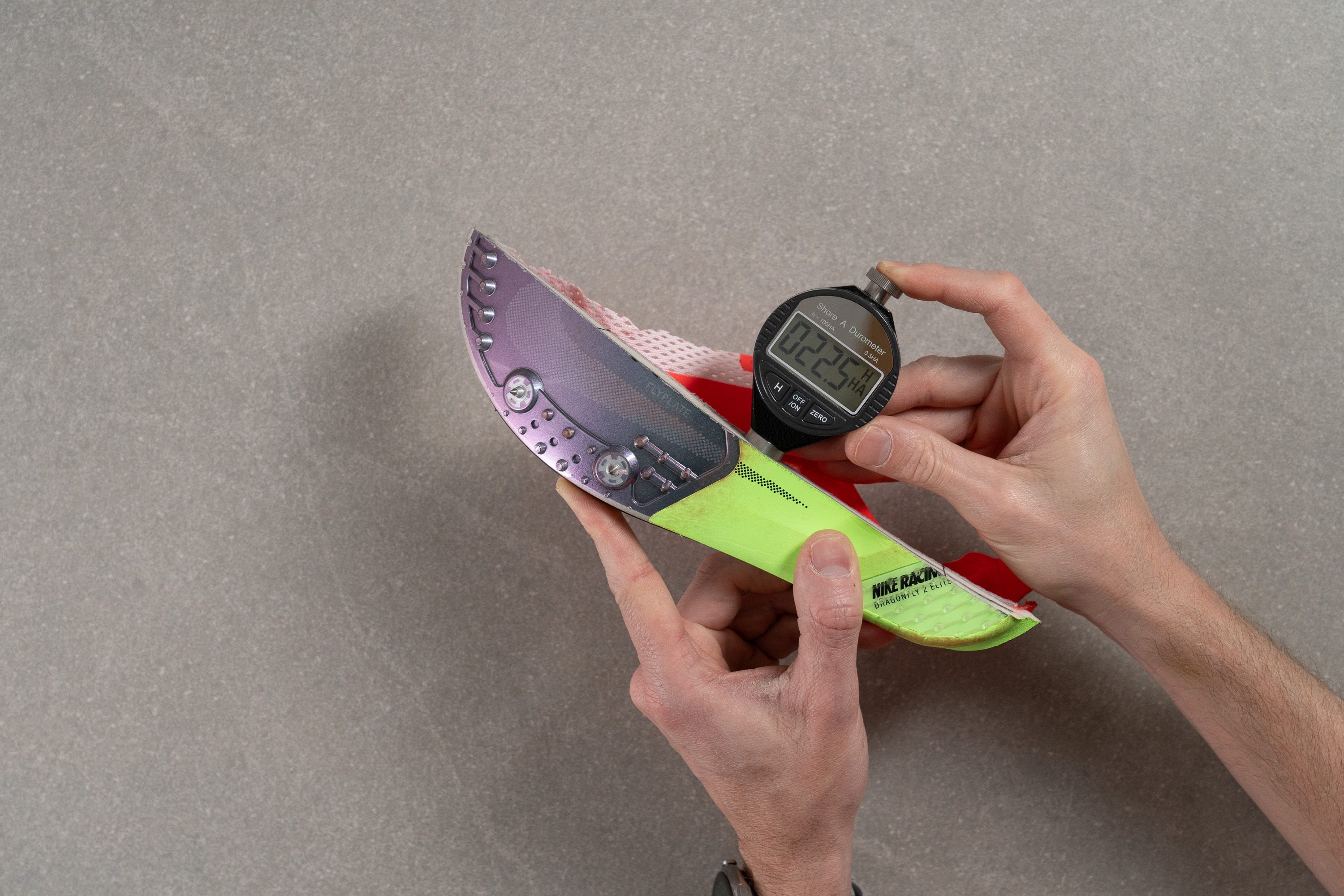
| Dragonfly 2 Elite | 22.5 HA |
| Average | 23.8 HA |
Plate
The biggest difference between the Dragonfly 2 Elite and the standard version—aside from the price—is the full-length carbon fiber plate, known as the FlyPlate. It adds serious stiffness and a more propulsive feel.
However, that comes with a trade-off: a firmer, more direct ride that some runners may find too harsh. It definitely favors those who thrive in road super shoes like the Nike Vaporfly 3 that help a lot with issues like limited ankle dorsiflexion.
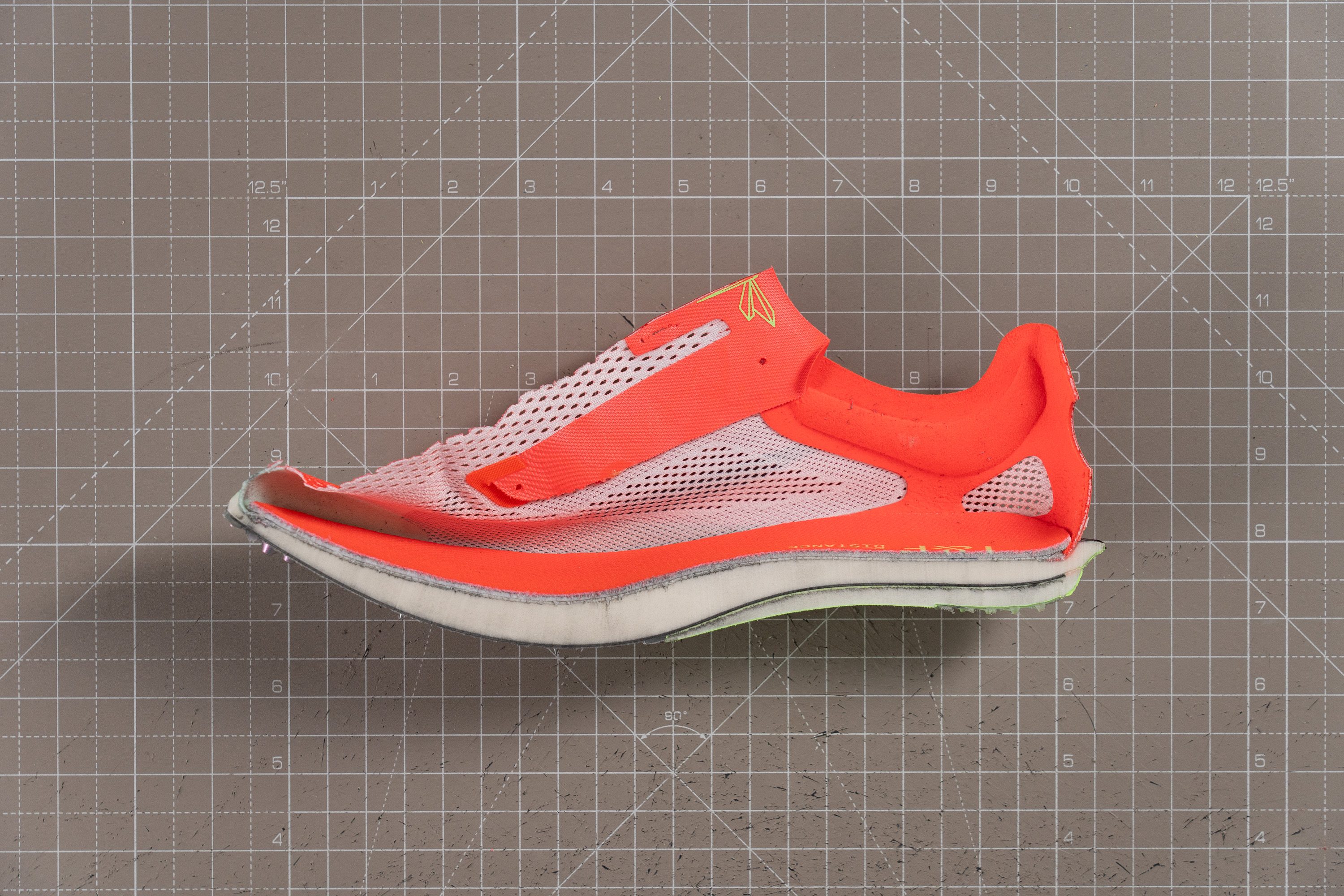
Secondary foam
The green foam beneath the plate in the midfoot and heel measures slightly softer at 15.5 HA—clearly aiming for a more cushy feel in that zone, where high responsiveness isn’t as critical.
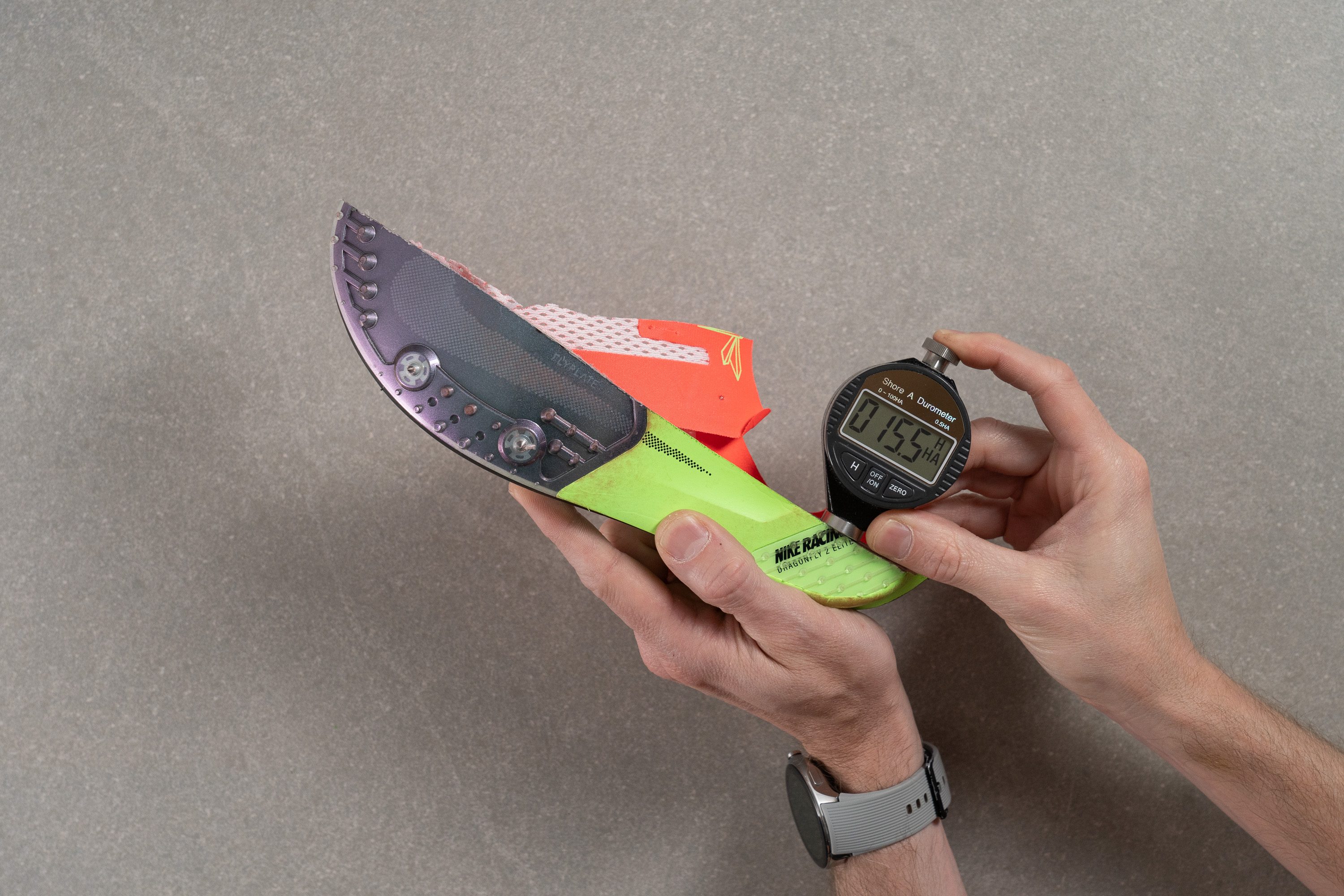
Size and fit
Size
Nike Dragonfly 2 Elite fits true to size (29 votes).
Width / Fit
The last of the shoe is said to be identical to the regular Dragonfly 2—but that’s according to Nike. We still wanted to double-check it using our gel mold, which gives us a precise look at the internal fit.
After making the mold, we measured 90.1 mm at the widest part, just 0.2 mm narrower than its sibling. That confirms the same roomy, long-distance-focused fit. So if you’re upgrading from the standard version, expect it to feel nearly identical, as those tiny differences are impossible to notice on foot.
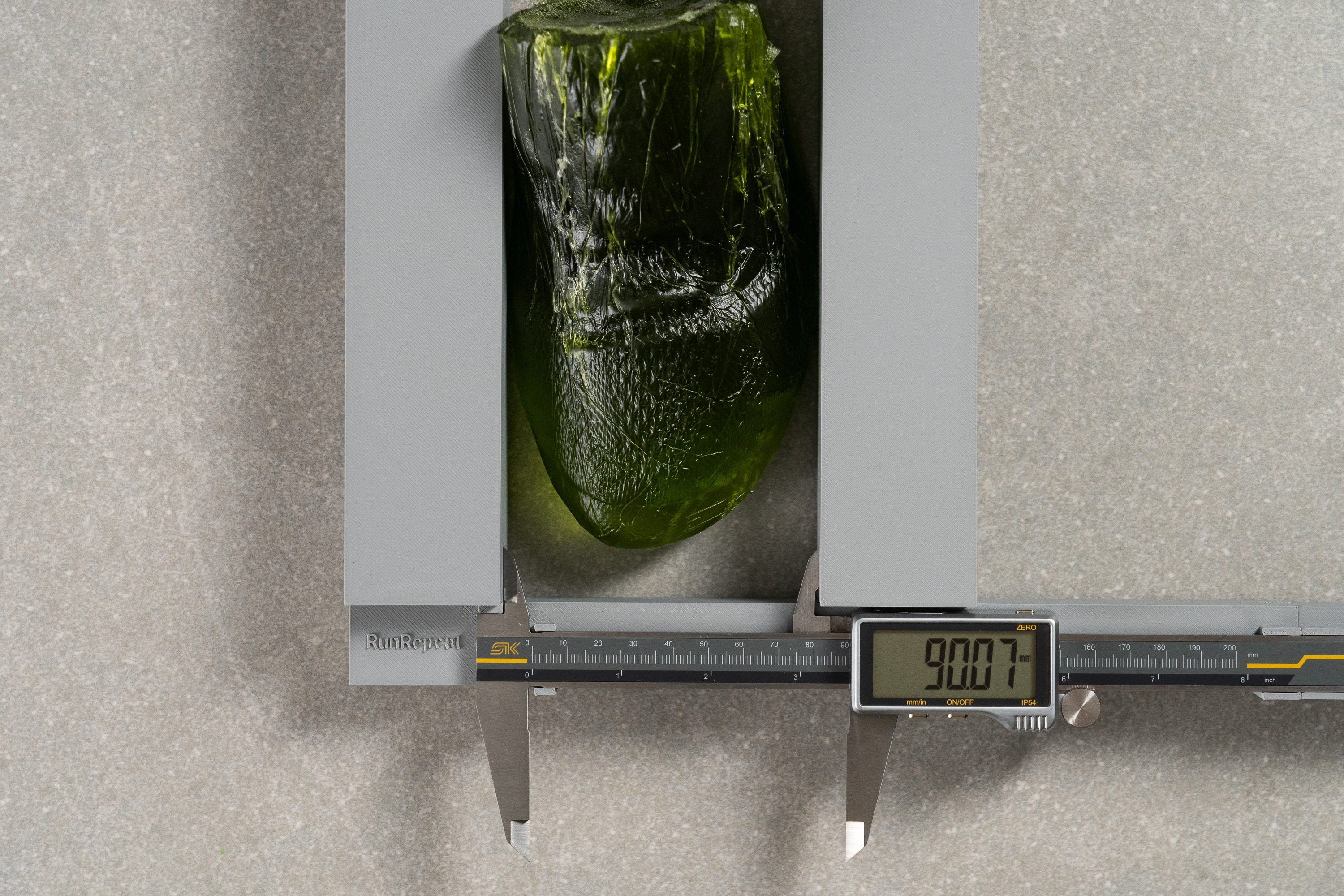
| Dragonfly 2 Elite | 90.1 mm |
| Average | 88.4 mm |
Toebox width
Our second measurement focused on the big toe area, where we recorded 68.4 mm. That’s right around the average, so you can expect the Dragonfly 2 Elite to offer a standard, no-surprises fit up front.
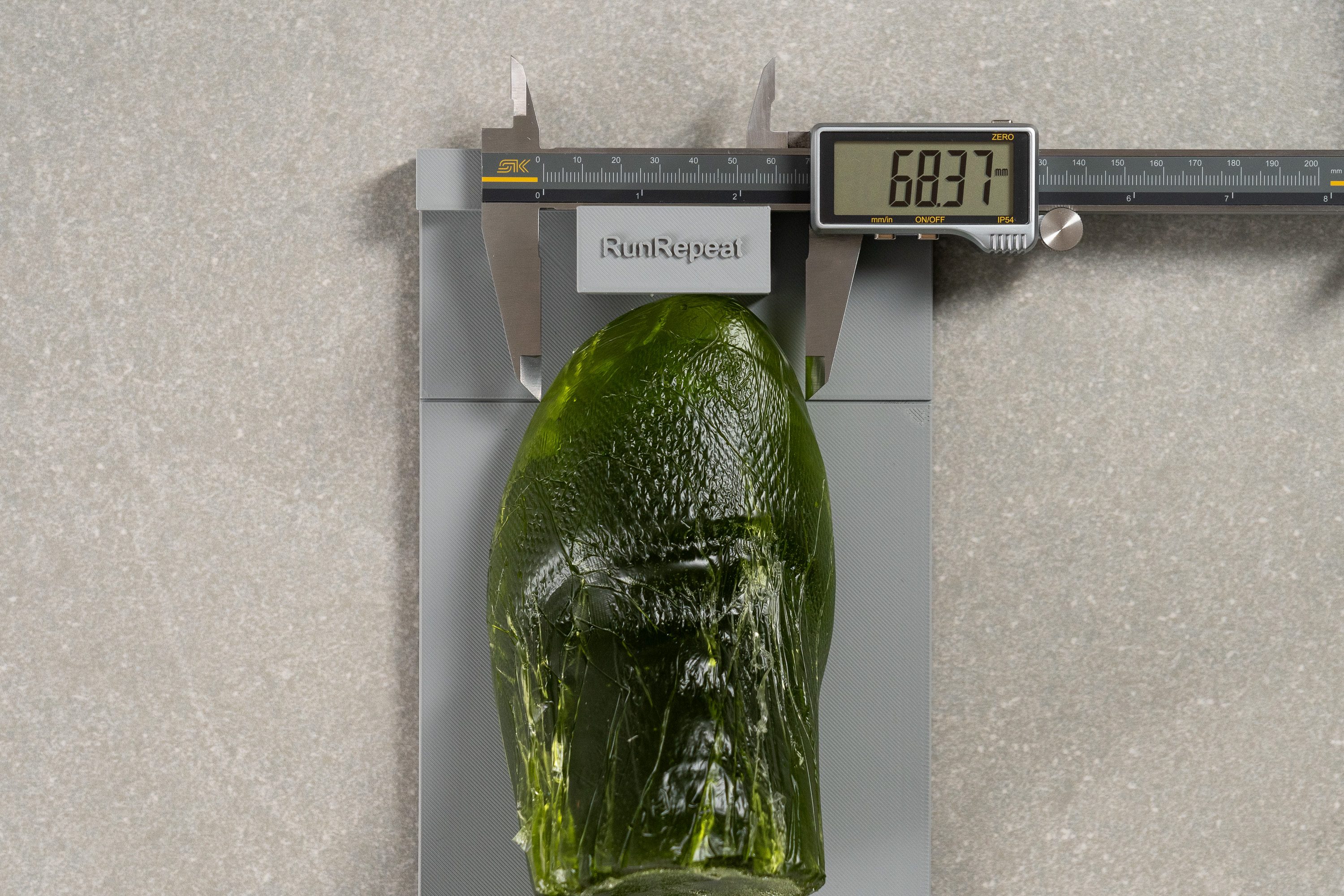
| Dragonfly 2 Elite | 68.4 mm |
| Average | 69.0 mm |
Toebox height
We also found generous space for the toes vertically, measuring 28.6 mm.
That’s great for long races, though runners who prefer an ultra-snug fit might not love the extra room for upward movement.
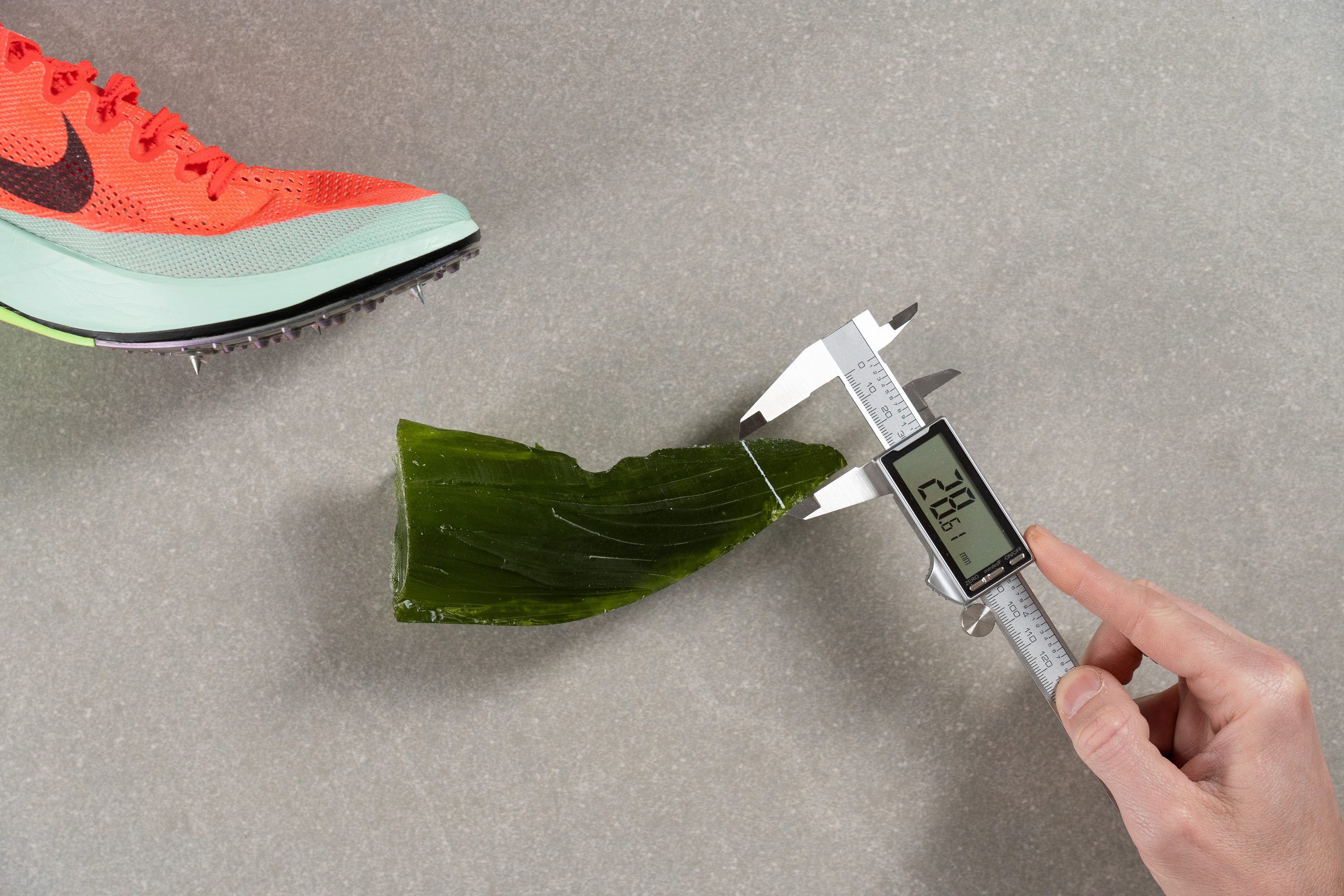
| Dragonfly 2 Elite | 28.6 mm |
| Average | 25.8 mm |
Weight
At 4.55 oz or 129g, the Elite version comes in much lighter than its standard counterpart, which weighed 5.10 oz or 145g. That’s a big difference!
We discovered that Nike pulled off something remarkable here, delivering a near-weightless design that practically vanishes underfoot.
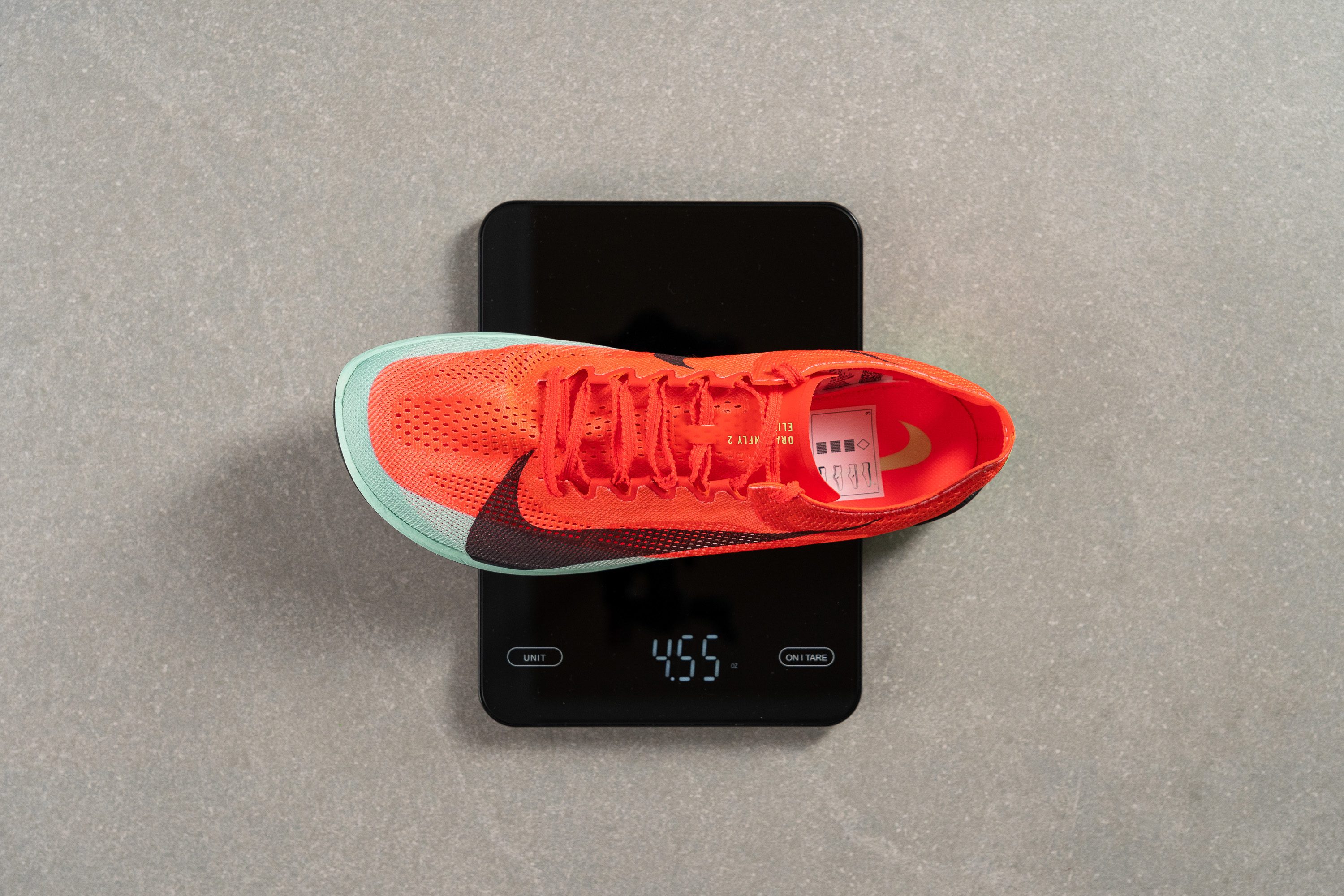
| Dragonfly 2 Elite | 4.6 oz (129g) |
| Average | 5.6 oz (158g) |
Breathability
The Dragonfly 2 Elite brings the same ultra-light feel we loved in the regular edition. We were blown away by how thin and see-through it looked, and we couldn’t wait to test it.
After firing up the smoke machine, our expectations were quickly confirmed. Smoke escaped effortlessly from every angle, leading us to award it a race-grade 5/5 in breathability. There's simply no question about it.
Then we pulled out our light test, and the results were stunning. The upper is razor-thin from heel to toe, allowing maximum airflow throughout. It’s a featherlight design that makes running sockless in long-distance events a perfect option.
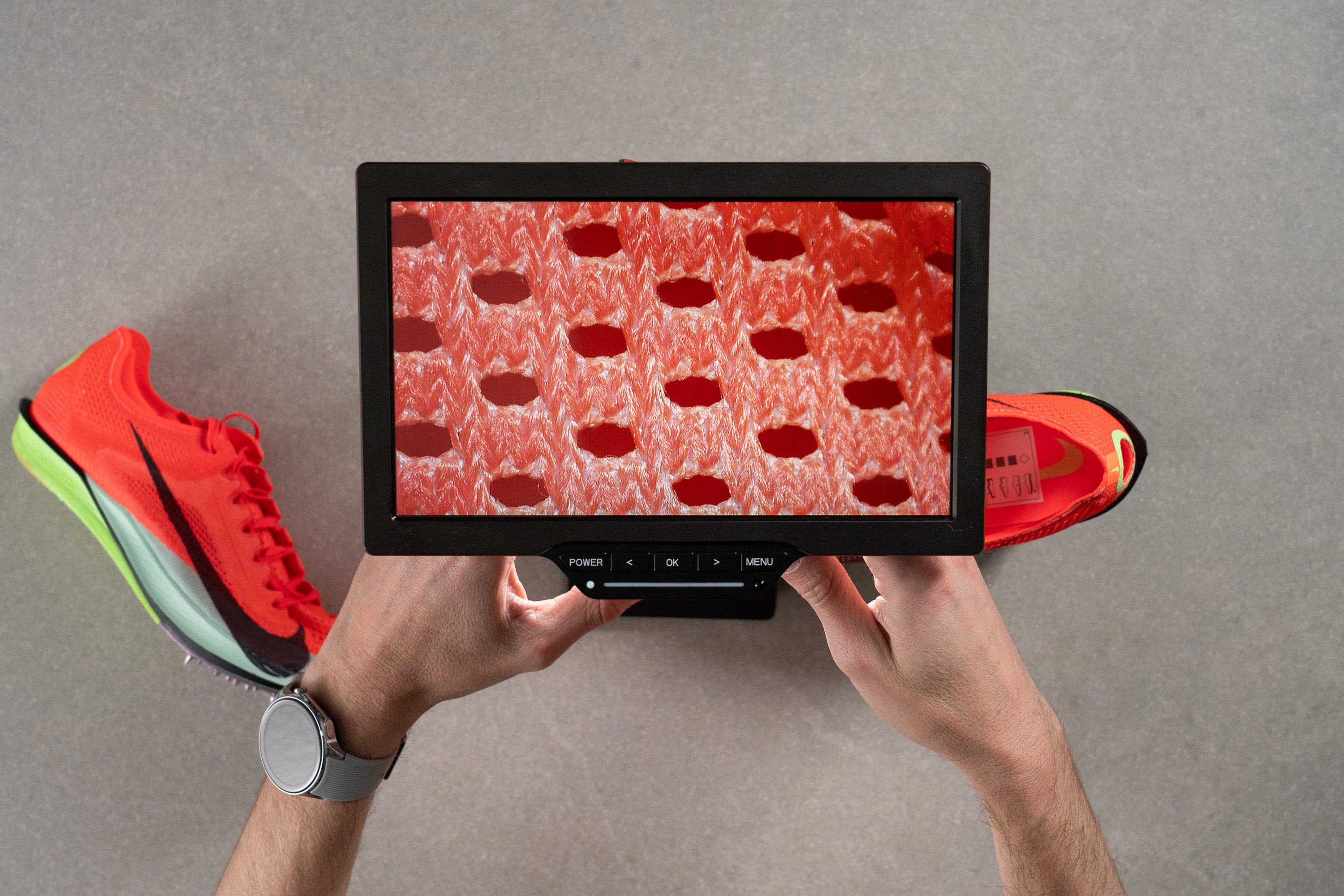
Curious to get a closer look, we moved to the microscope station.
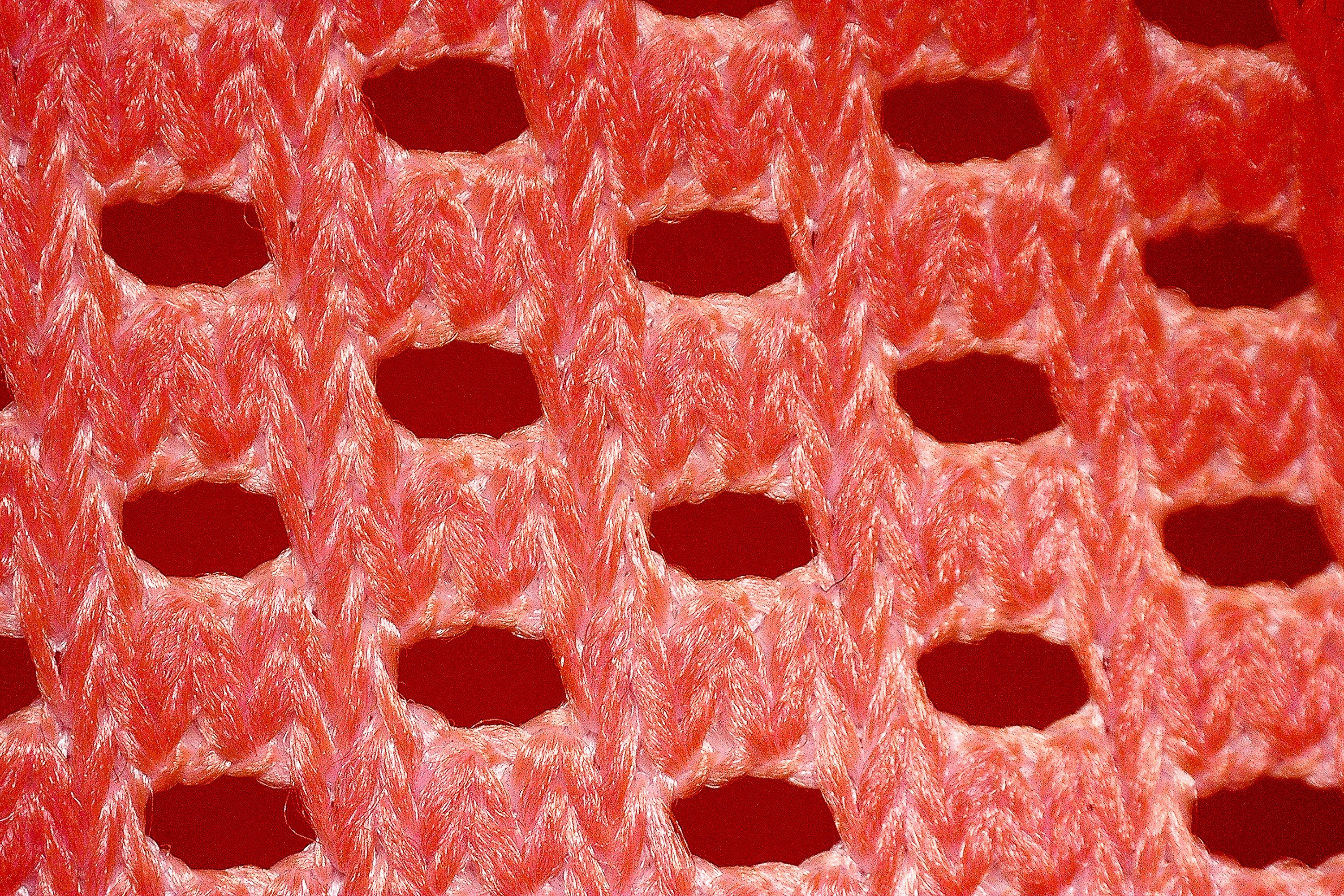
While Nike could have used Atomknit or Flyknit for this Elite version, they instead went with a classic engineered mesh—only this one’s packed with wide-open ventilation holes.
We also noticed a small amount of padding along the medial and lateral sides. It’s just enough for a bit of grip and comfort, but clearly, this upper is a weight-saving, performance-first construction from start to finish.
| Dragonfly 2 Elite | 5 |
| Average | 4.1 |
Stability
Torsional rigidity
With a carbon-fiber plate inside, it’s no surprise that the Dragonfly 2 Elite delivers high torsional rigidity—scoring a 4/5 on our manual scale.
| Dragonfly 2 Elite | 4 |
| Average | 3.3 |
Heel counter stiffness
On the other hand, heel counter stiffness is extremely low at 1/5, and that's exactly what we expect from a race-ready spike. Heel stability relies entirely on your body—there’s zero built-in support back there.
| Dragonfly 2 Elite | 1 |
| Average | 1.7 |
Midsole width - forefoot
The same feel of the Dragonfly 1 and 2 carries over to the Dragonfly 2 Elite, as the midsole dimensions remain nearly unchanged. Up front, a wide 97.8 mm forefoot allows for stable landings, making it a solid pick for forefoot strikers looking for powerful takeoffs.
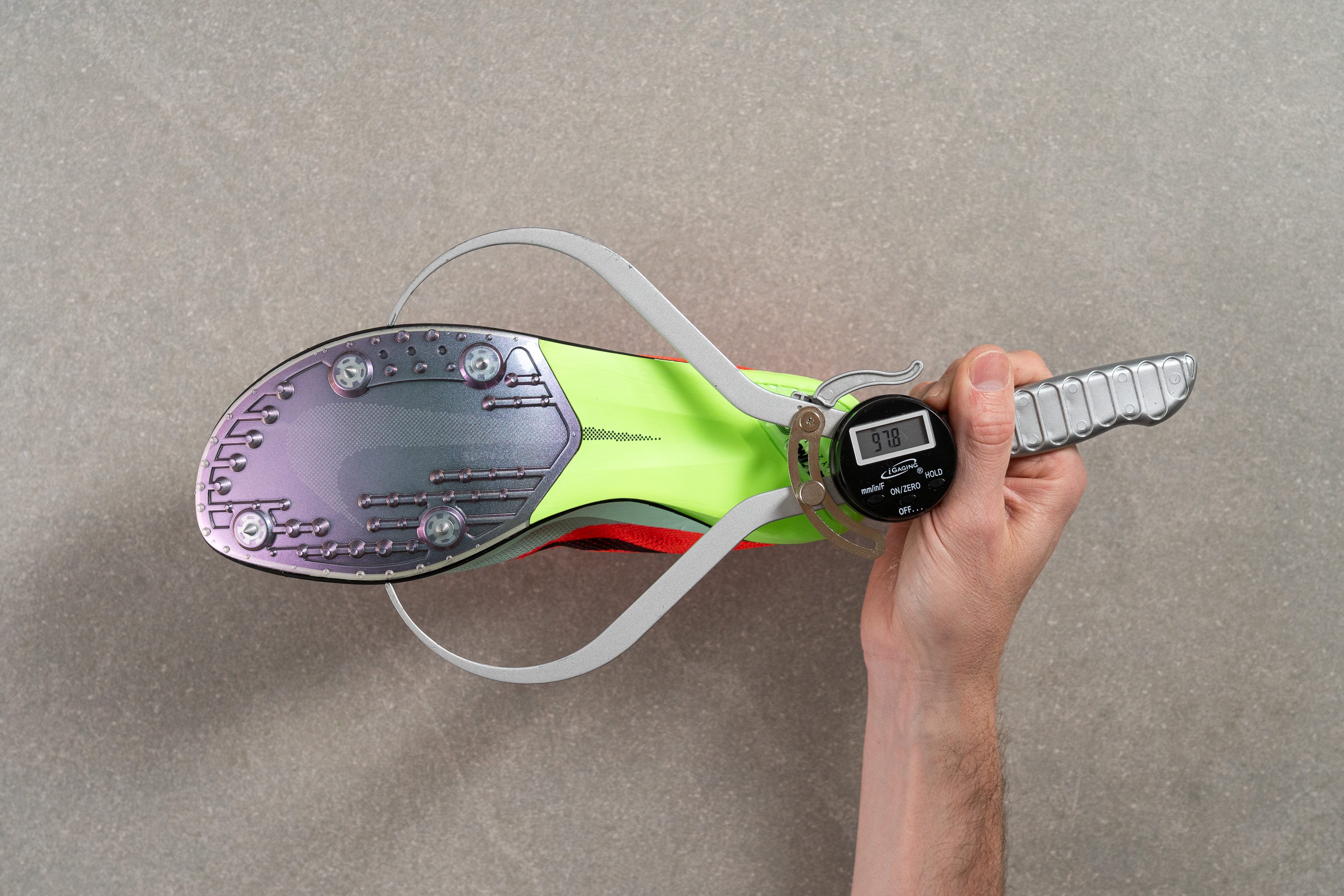
| Dragonfly 2 Elite | 97.8 mm |
| Average | 95.1 mm |
Midsole width - heel
The heel is, as expected, impressively narrow compared to any running shoe—yet it aligns closely with other track spikes, measuring 63.9 mm.
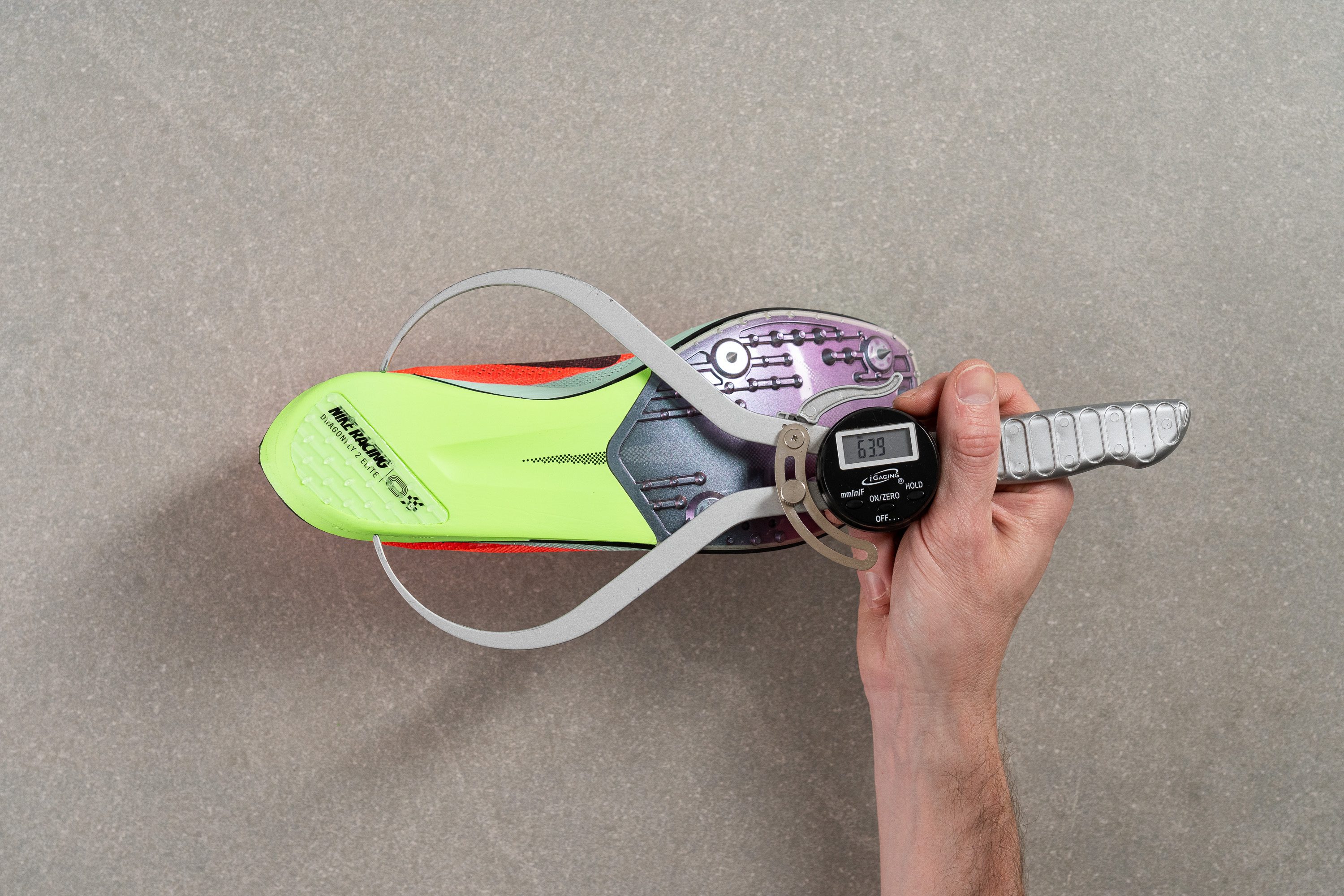
| Dragonfly 2 Elite | 63.9 mm |
| Average | 63.0 mm |
Durability
Toebox durability
As expected, the toebox gave in quickly to our Dremel—it’s ultra-thin and has zero protective layers. Hence, we had no choice but to give it a fragile-feeling 1/5!
| Dragonfly 2 Elite | 1 |
| Average | 2.4 |
Heel padding durability
We found the heel padding to be surprisingly durable—thanks to the simple design focused on performance and weight savings. After testing, we discovered a strong 4/5 rating was more than justified.
It's interesting that having less padding in the heel area actually brings a better result.
| Dragonfly 2 Elite | 4 |
| Average | 3.6 |
Outsole thickness
The Dragonfly 2 Elite features a 3.0 mm rubber patch in the heel to protect the foam and boost grip in that area.
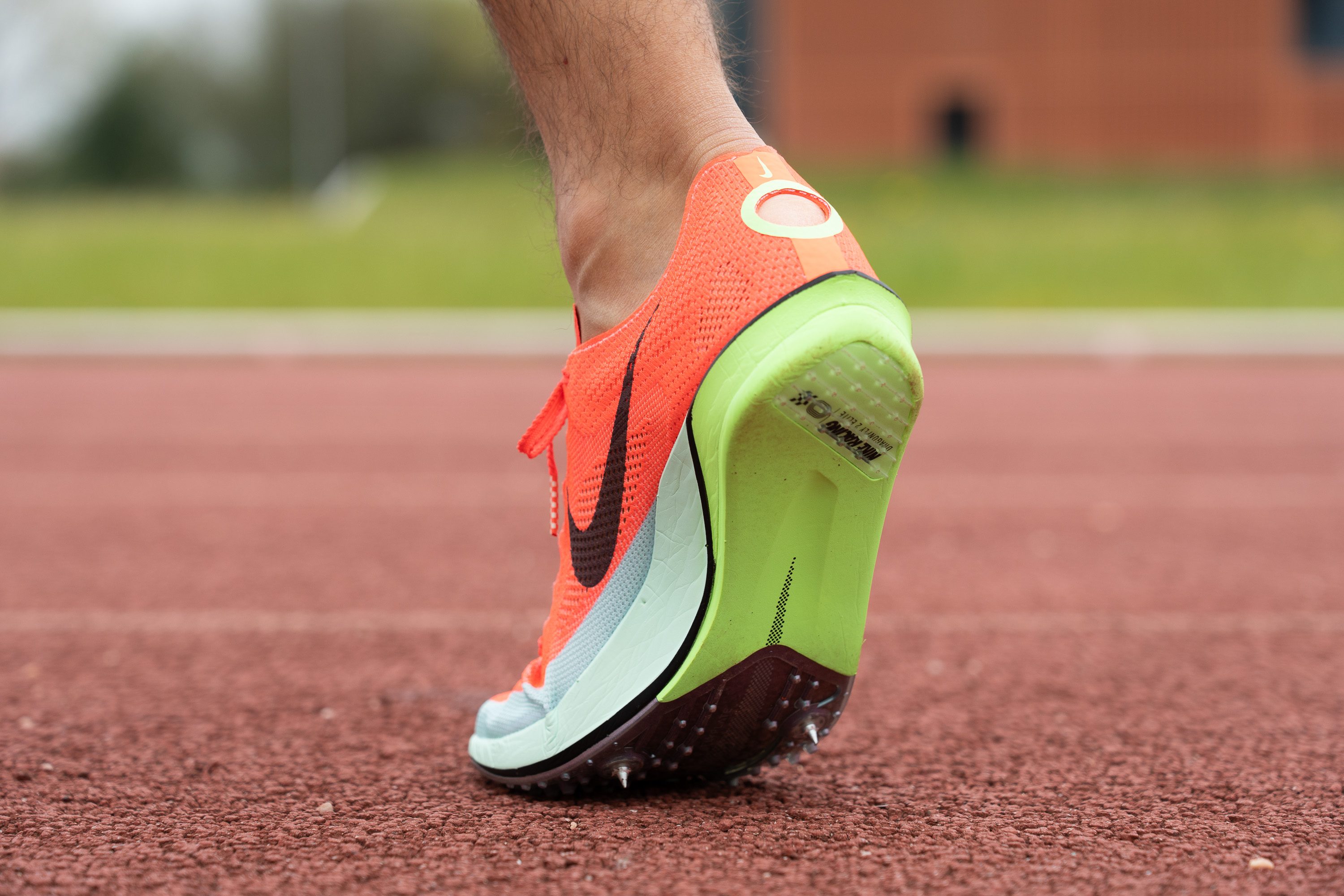
However, the midfoot stays exposed to maximize foam use and energy return.
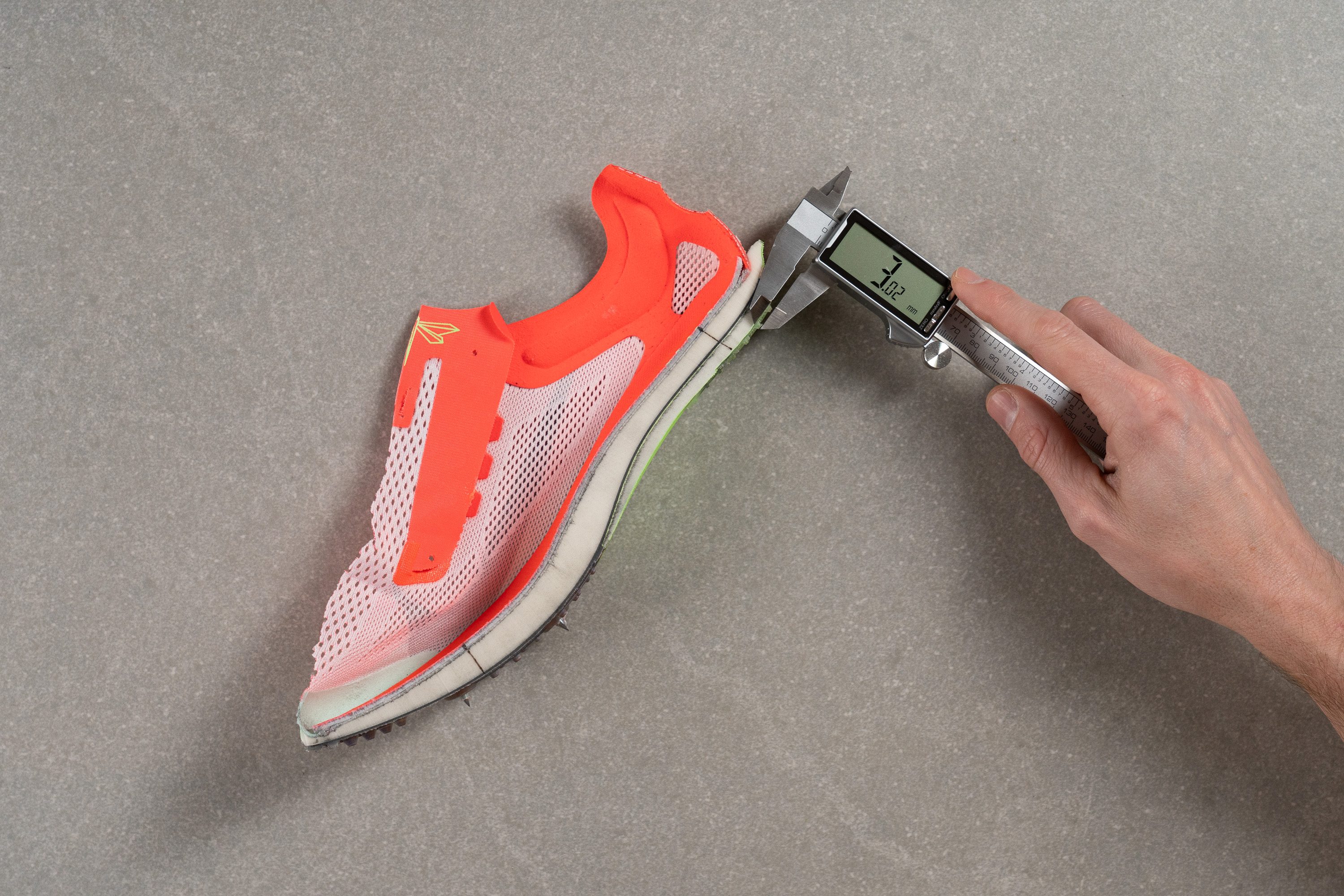
| Dragonfly 2 Elite | 3.0 mm |
| Average | 2.7 mm |
Pins
Unlike the regular Dragonfly 2, the Elite version features four permanent 6-mm pins for weight savings and better traction. However, we think there’s a major trade-off here, as long-term durability might be an issue since they can't be replaced.
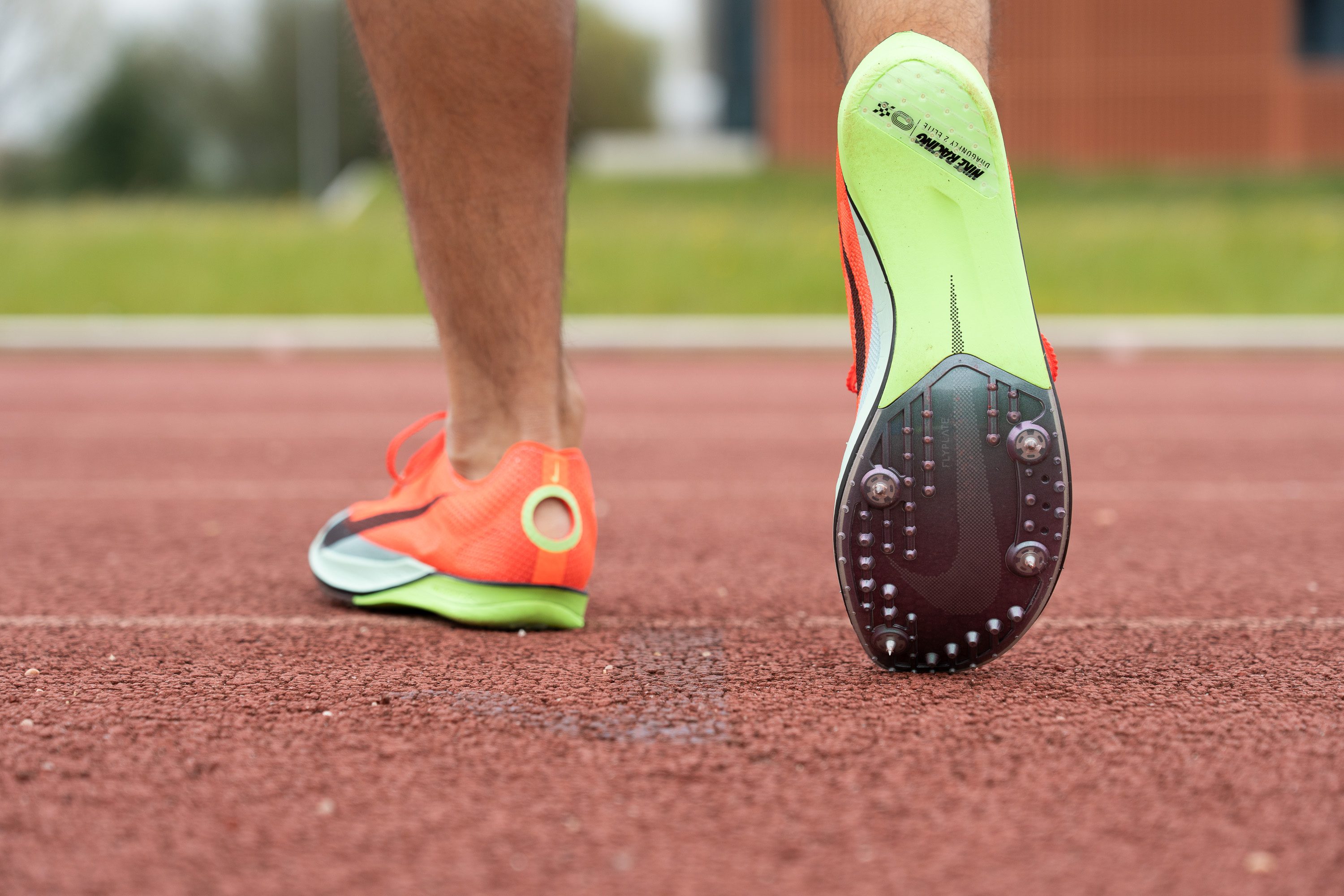
Misc
Insole thickness
The non-removable insole is ultra-thin at just 2.3 mm. It's clearly designed to maximize foam underfoot while staying within World Athletics regulations.
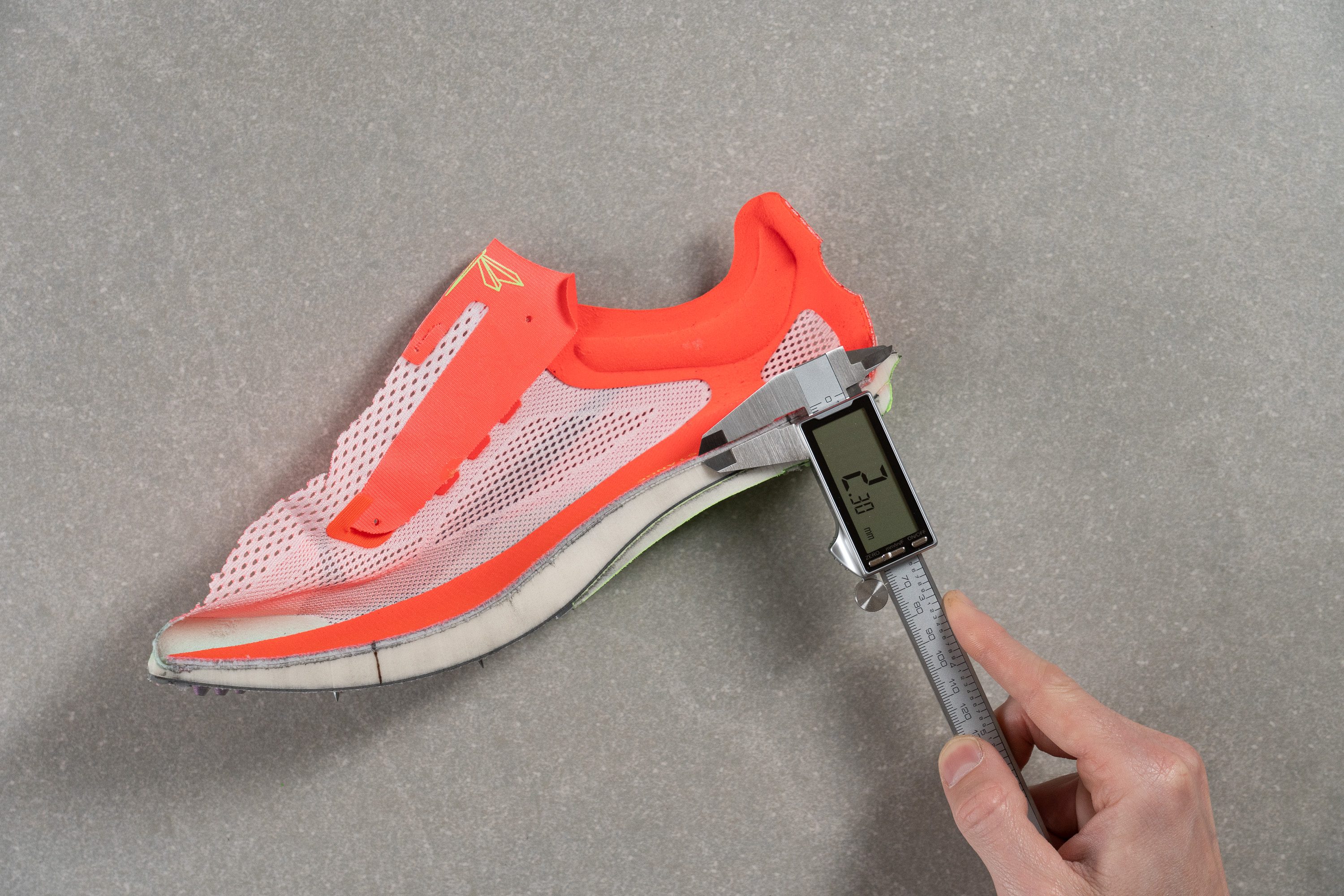
| Dragonfly 2 Elite | 2.3 mm |
| Average | 2.9 mm |
Tongue padding
The lacing system is basically all we could ask for from a superspike. It features the same race-ready notched laces we praised in Nike’s top-tier super shoes like the Alphafly 3.
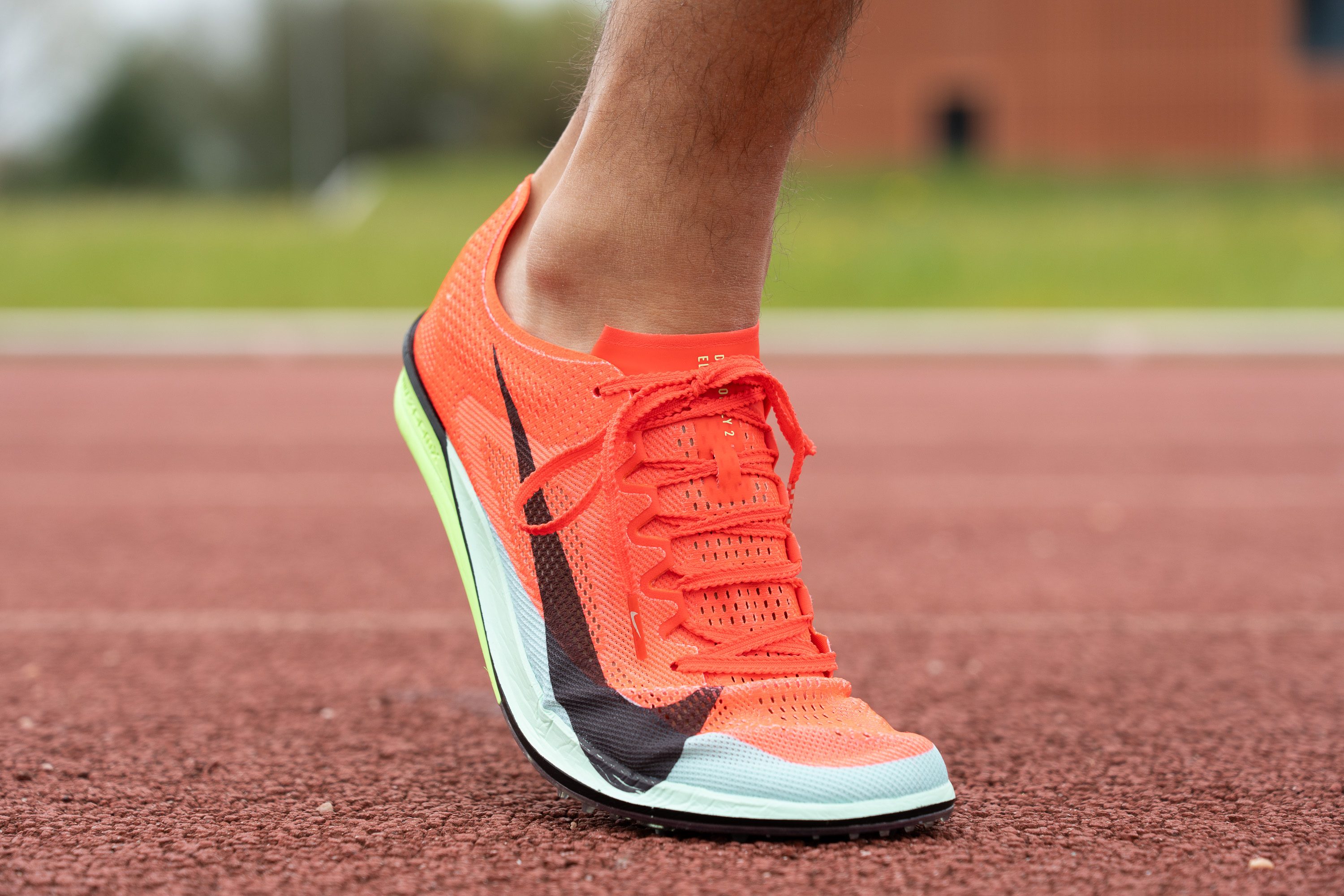
We also found an ultra-thin tongue measuring just 0.9 mm. And we loved it—we’re here for weight savings, and in this case, comfort takes a back seat. It’s also hyper-ventilated for sockless track racing.
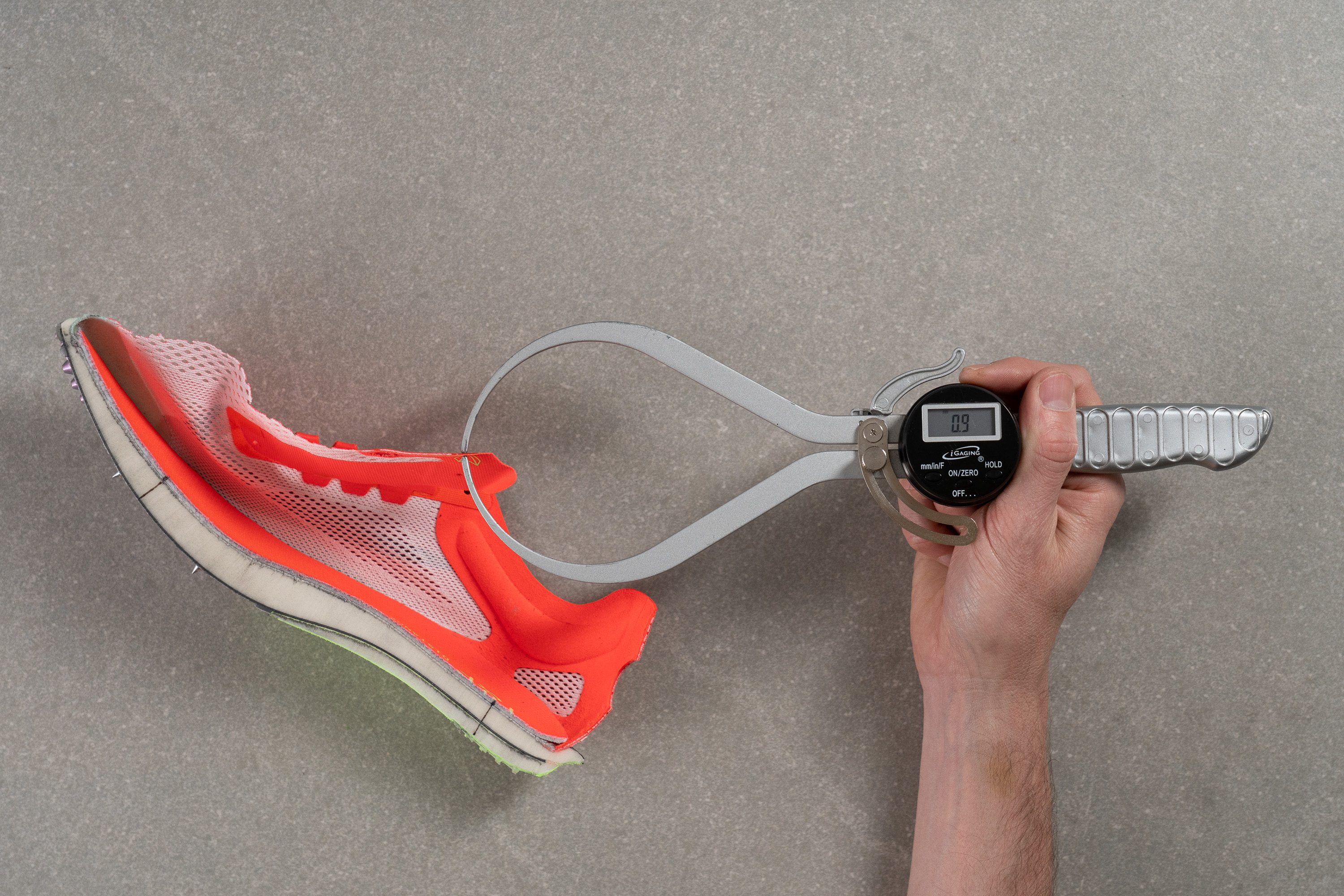
| Dragonfly 2 Elite | 0.9 mm |
| Average | 2.3 mm |
Heel tab
Nike kept the same iconic design we saw in the first-gen Dragonfly, featuring the hole punch in the heel. And it works brilliantly—it shaves a few grams, boosts heel lockdown, enhances airflow, and adds a standout look.
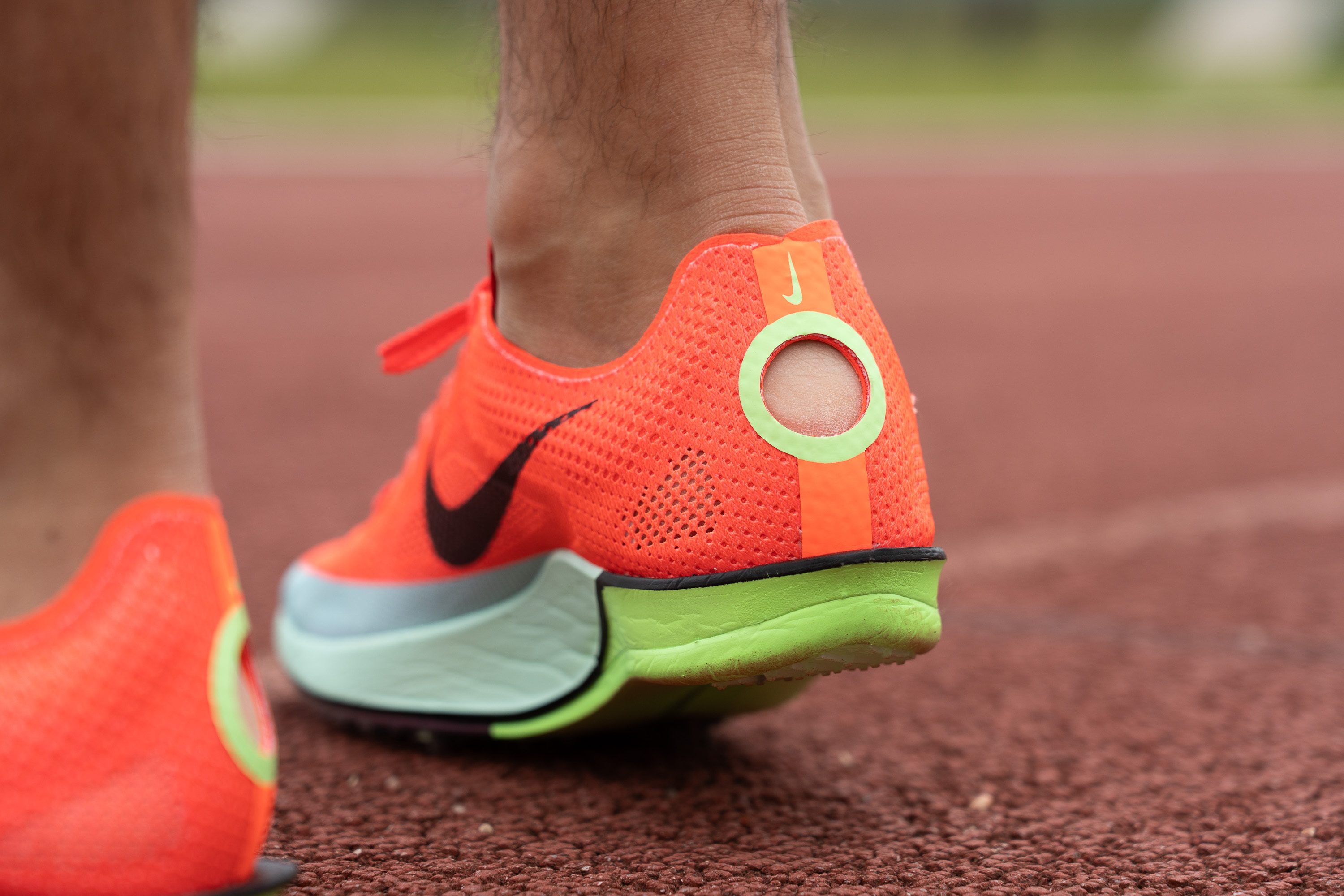
| Dragonfly 2 Elite | None |
Price
The Dragonfly 2 Elite is one of the most expensive track spikes ever made—but also one of the fastest, with dozens of Olympic and World Championship medals backing its performance. So whether it’s worth the price comes down to how much you value those few seconds (at most) it might shave off compared to a cheaper option.
| Dragonfly 2 Elite | $190 |
| Average | $138 |

